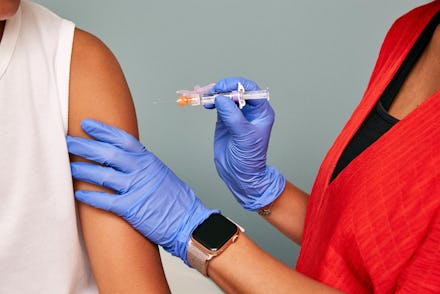Trump is pushing for a coronavirus vaccine by November. Here's why that's dangerous

As of today, there are 27 COVID-19 vaccines in human trials. The quest for a quick vaccine has been dubbed “Operation Warp Speed” in the Trump Administration and many scientists feel pressured to deliver a vaccine before the election. A safe, effective, and widely available vaccine would be a godsend, of course, but some scientists are concerned that the political pressure to produce a coronavirus vaccine quickly is not conducive to good science.
There’s a reason why vaccine trials generally take up to 10 years to move from research to market availability. Once a vaccine has been developed, it must go through preclinical trials in rats or monkeys, and then three phases of human trials — with increasing numbers of humans — before it’s approved for general use, the New York Times reported. Each of these phases requires extensive assessment, given that vaccines are supposed to be safe for most people in the population.
One way researchers can speed things up is by combining phases of a trial. That means that a vaccine could move from being tested in rats to being tested in hundreds of humans. Or it could move rapidly from being tested on just a few people to being tested on thousands, the Times reported. As you can imagine, a more comprehensive trial would leave more time and room to produce the most effective vaccine with the least side effects.
Some scientists fear that the Trump administration placing pressure on scientists and pharmaceutical companies to come up with the fastest possible option may yield a vaccine that’s not as most safe and effective as it could possibly be. This could ultimately compromise the reputation of researchers working on vaccines and, more broadly, the public may lose hope in science. Anti-vaxxers are already an obstacle we will have to face in vaccine distribution, and even rational people might be swayed to the dark anti-vaxxer side if this rush to vaccinate has less than impressive results.
Drug companies have a major incentive to work quickly, as the government is currently funding their COVID-19 vaccine research efforts, said the Times. And some of the higher ups in The Food and Drug Administration (who can approve broad use of vaccines) and Health and Human Services — which is spearheading the development of vaccines and can approve emergency use — do essentially work for Trump. But they also work in the public interest.
But some officials argue that warp speed doesn’t have to mean bad science and that there are checks in place to ensure that the pressure those in elected positions feel doesn’t spill into laboratories. “My job is to make sure that any pressure that comes to the agency is not reflected downward” onto scientists working on the vaccines, Stephen Hahn, the commissioner of the Food and Drug Administration (and the scientist who coined the “Operation Warp Speed” moniker) said in an interview in Journal of the American Medical Association. Hahn gave emergency approval to two anti-malaria drugs, which the FDA later revoked. That may make him seem less credible, but the fact that there was, in fact, a system in place to check and revoke his decision bolsters his argument.
Is there a political element at play in the development of a COVID-19 vaccine? Indubitably. Is it nefarious? That may depend on your political stance. But even if you don’t trust science or politics, have faith that the capitalist impulse will ensure that a deadly vaccine doesn’t make it to the market. It would be “a huge reputational risk not just for your vaccine but for all the products across your portfolio,” Rob Smith, the director of research firm Capital Alpha Partners, told the Times.